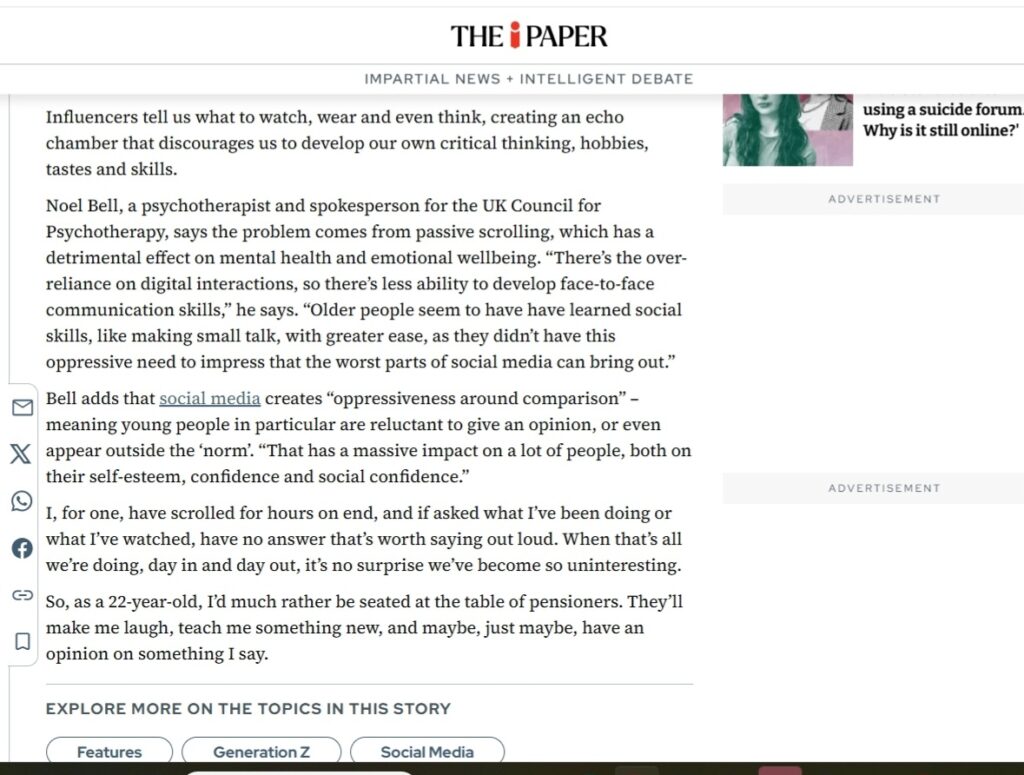
I am quoted in the attached article by Kia-Elise Green from the iPAPER about the influence of social media, and specifically, the effects on the Gen Z generation and their ability to be able to engage in conversation. See the attached link for my quotes.
If you listen to any of the legislative chamber investigations into the topic, such as the one undertaken by the House of Commons Science and Technology Committee, the representatives from the technology platforms will readily admit, in their written and oral evidence, to the dangers of passive scrolling of their products for users’ emotional well-being and mental health. They would, of course, argue that the better use of their products is when users engage online with other people that leads to face to face encounters in the physical world. Examples of this might be connecting again with long lost school friends, or through meetup groups engaging in activities in the community such as 5k runs or joining social classes, or suchlike. It should also be acknowledged that the effects of screen time need to take account of what is actually being consumed. There is passive scrolling, and engaging in the worst form of social comparison, and then there is screen time watching a university lecture or a highly informative podcast, for instance.
The trouble with such justifications from the technology platforms is that they feed and monetise the monkey brain loops. They do this by employing some of the same techniques that casinos have used for decades such as variable reward scheduling (getting likes and followers etc.) The real dangers are that people are more prone to anxiety, depression and social comparison. Out of interest, I did a search on the Google search facility and asked a list of the dangers of social media. Their AI window produced the following result:
“Social media use can lead to various mental health issues, including anxiety, depression, and even addiction. It can also promote superficial connections and social comparison, leading to feelings of inadequacy and low self-esteem. Furthermore, social media can be a breeding ground for cyberbullying, harassment, and the spread of misinformation“.
A lot of older people seem to have learned social skills more easily, such as making small talk, and mixing with others on a casual basis. This, of course, is potentially a wild generalisation as there are a lot of older people who also lack basic social skills. The Gen Z generation don’t know anything other than the internet, smartphones and instant search and news availability. Whilst this affords enormous opportunities for excellerated learning there are potentially no bookends on time spent consuming the products given the 24/7 nature of the technological platforms. Chat GBT might be new but this advance is not as revolutionary for them as the emergence of windows interface, the iPhone and increased computing power over time was for people who saw these things gradually emerge. Gen Z are witnessing rapid technological change almost seamlessly whereas older people knew what it was like to be social in the physical world before the advances came.
What’s the answer to the dangers of social media? The trouble with seeking to answer such a question is knowing what you are seeking to answer. Are you seeking to detox from overuse of social media? Are you a parent seeking to guide your children on appropriate usage of social media in the digital age? Have you become addicted to things online? Knowing the question might inform the answer. Start by going for walks. Leave your phone at home. Smell the smells, notice nature and try to breathe deeply. Try also to learn how to restrict the use of device time. The right question might come as you ponder these thoughts.
Noel Bell is a UKCP accredited psychotherapist and can be contacted on 07852407140